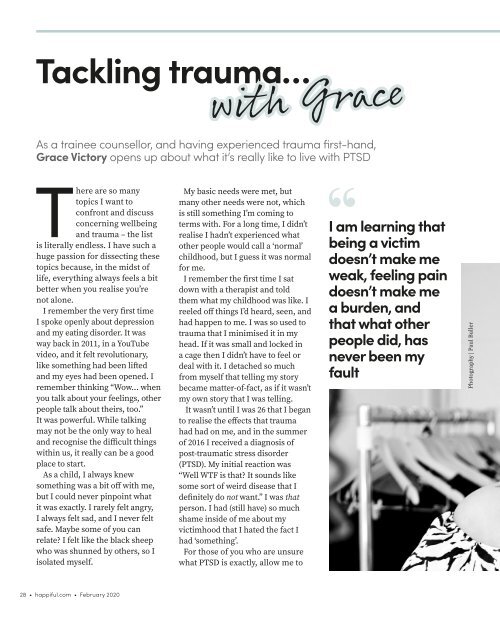Happiful February 2020
You also want an ePaper? Increase the reach of your titles
YUMPU automatically turns print PDFs into web optimized ePapers that Google loves.
Tackling trauma…<br />
with Grace<br />
As a trainee counsellor, and having experienced trauma first-hand,<br />
Grace Victory opens up about what it’s really like to live with PTSD<br />
There are so many<br />
topics I want to<br />
confront and discuss<br />
concerning wellbeing<br />
and trauma – the list<br />
is literally endless. I have such a<br />
huge passion for dissecting these<br />
topics because, in the midst of<br />
life, everything always feels a bit<br />
better when you realise you’re<br />
not alone.<br />
I remember the very first time<br />
I spoke openly about depression<br />
and my eating disorder. It was<br />
way back in 2011, in a YouTube<br />
video, and it felt revolutionary,<br />
like something had been lifted<br />
and my eyes had been opened. I<br />
remember thinking “Wow... when<br />
you talk about your feelings, other<br />
people talk about theirs, too.”<br />
It was powerful. While talking<br />
may not be the only way to heal<br />
and recognise the difficult things<br />
within us, it really can be a good<br />
place to start.<br />
As a child, I always knew<br />
something was a bit off with me,<br />
but I could never pinpoint what<br />
it was exactly. I rarely felt angry,<br />
I always felt sad, and I never felt<br />
safe. Maybe some of you can<br />
relate? I felt like the black sheep<br />
who was shunned by others, so I<br />
isolated myself.<br />
My basic needs were met, but<br />
many other needs were not, which<br />
is still something I’m coming to<br />
terms with. For a long time, I didn’t<br />
realise I hadn’t experienced what<br />
other people would call a ‘normal’<br />
childhood, but I guess it was normal<br />
for me.<br />
I remember the first time I sat<br />
down with a therapist and told<br />
them what my childhood was like. I<br />
reeled off things I’d heard, seen, and<br />
had happen to me. I was so used to<br />
trauma that I minimised it in my<br />
head. If it was small and locked in<br />
a cage then I didn’t have to feel or<br />
deal with it. I detached so much<br />
from myself that telling my story<br />
became matter-of-fact, as if it wasn’t<br />
my own story that I was telling.<br />
It wasn’t until I was 26 that I began<br />
to realise the effects that trauma<br />
had had on me, and in the summer<br />
of 2016 I received a diagnosis of<br />
post-traumatic stress disorder<br />
(PTSD). My initial reaction was<br />
“Well WTF is that? It sounds like<br />
some sort of weird disease that I<br />
definitely do not want.” I was that<br />
person. I had (still have) so much<br />
shame inside of me about my<br />
victimhood that I hated the fact I<br />
had ‘something’.<br />
For those of you who are unsure<br />
what PTSD is exactly, allow me to<br />
I am learning that<br />
being a victim<br />
doesn’t make me<br />
weak, feeling pain<br />
doesn’t make me<br />
a burden, and<br />
that what other<br />
people did, has<br />
never been my<br />
fault<br />
Photography | Paul Buller<br />
28 • happiful.com • <strong>February</strong> <strong>2020</strong>

















